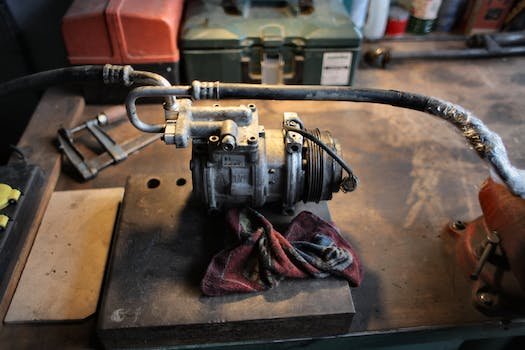Sustainability Practices in the Dewalt Air Compressor Repair Business: A Comprehensive Guide
As the world becomes more conscious of the environmental impact of various industries, businesses are increasingly adopting sustainable practices to reduce their carbon footprint. The Dewalt Air Compressor Repair business is no exception. In this comprehensive guide, we will explore the various sustainability practices that can be implemented in this industry, ensuring a greener and more eco-friendly approach to air compressor repair.
1. Energy-Efficient Equipment: The Key to Sustainability
One of the most effective ways to promote sustainability in the Dewalt Air Compressor Repair business is by using energy-efficient equipment. By investing in modern, energy-saving air compressors, businesses can significantly reduce their energy consumption and carbon emissions. These new models are designed to optimize performance while minimizing energy waste, making them an ideal choice for sustainable repair practices.
Additionally, regular maintenance and servicing of air compressors can help identify and fix any issues that may lead to energy inefficiency. By ensuring that all equipment is in top working condition, businesses can maximize energy savings and minimize their environmental impact.
2. Recycling and Proper Disposal of Compressor Parts
Another crucial aspect of sustainability in the Dewalt Air Compressor Repair business is the proper disposal and recycling of compressor parts. Instead of simply discarding old or damaged parts, businesses should implement recycling programs to ensure that these components are reused or disposed of in an environmentally friendly manner.
By partnering with recycling facilities or organizations that specialize in compressor parts, businesses can contribute to the circular economy and reduce the amount of waste generated. This not only benefits the environment but also helps conserve valuable resources.
3. Efficient Inventory Management to Minimize Waste
Efficient inventory management is essential for sustainability in the Dewalt Air Compressor Repair business. By accurately tracking and managing inventory levels, businesses can minimize waste and reduce the need for excessive ordering or storage of spare parts.
Implementing inventory management systems and software can help streamline the process, ensuring that businesses have the right parts available when needed, without overstocking or wasting resources. This not only reduces waste but also improves overall operational efficiency.
4. Training and Education for Sustainable Practices
Training and education play a vital role in promoting sustainability in the Dewalt Air Compressor Repair business. By providing employees with the necessary knowledge and skills, businesses can ensure that sustainable practices are followed consistently.
Training programs can cover topics such as energy-efficient repair techniques, proper disposal methods, and the importance of recycling. By empowering employees with this knowledge, businesses can create a culture of sustainability and ensure that everyone is actively contributing to the greener approach.
5. Collaboration with Suppliers and Partners
Collaboration with suppliers and partners is crucial for sustainability in the Dewalt Air Compressor Repair business. By working closely with suppliers who prioritize sustainability, businesses can ensure that they are sourcing environmentally friendly products and materials.
Additionally, partnering with organizations that share the same sustainability goals can lead to innovative solutions and practices. By pooling resources and knowledge, businesses can collectively work towards a greener future for the air compressor repair industry.
6. Monitoring and Reporting Sustainability Metrics
Lastly, monitoring and reporting sustainability metrics is essential for businesses in the Dewalt Air Compressor Repair industry. By regularly tracking and analyzing key sustainability indicators, businesses can identify areas for improvement and set targets for reducing their environmental impact.
Metrics such as energy consumption, waste generation, and carbon emissions can provide valuable insights into the effectiveness of sustainability practices. By sharing these metrics with stakeholders and customers, businesses can demonstrate their commitment to sustainability and foster trust and loyalty.
Conclusion
In conclusion, sustainability practices in the Dewalt Air Compressor Repair business are crucial for reducing environmental impact and promoting a greener approach. By implementing energy-efficient equipment, recycling compressor parts, efficient inventory management, training employees, collaborating with suppliers, and monitoring sustainability metrics, businesses can make significant strides towards a more sustainable future.
Frequently Asked Questions (FAQs)
1. How can energy-efficient equipment benefit the Dewalt Air Compressor Repair business?
Energy-efficient equipment can significantly reduce energy consumption and carbon emissions, leading to cost savings and a smaller environmental footprint.
2. Why is proper disposal and recycling of compressor parts important?
Proper disposal and recycling of compressor parts contribute to the circular economy, reduce waste, and conserve valuable resources.
3. How does efficient inventory management promote sustainability?
Efficient inventory management minimizes waste, reduces the need for excessive ordering or storage of spare parts, and improves overall operational efficiency.
4. What role does training and education play in sustainable practices?
Training and education empower employees with the knowledge and skills to follow sustainable practices consistently, creating a culture of sustainability within the business.
5. Why is collaboration with suppliers and partners important for sustainability?
Collaboration with suppliers and partners ensures that businesses source environmentally friendly products and materials, leading to a greener approach overall.
6. How can monitoring and reporting sustainability metrics benefit businesses?
Monitoring and reporting sustainability metrics help identify areas for improvement, set targets for reducing environmental impact, and demonstrate a commitment to sustainability to stakeholders and customers.

